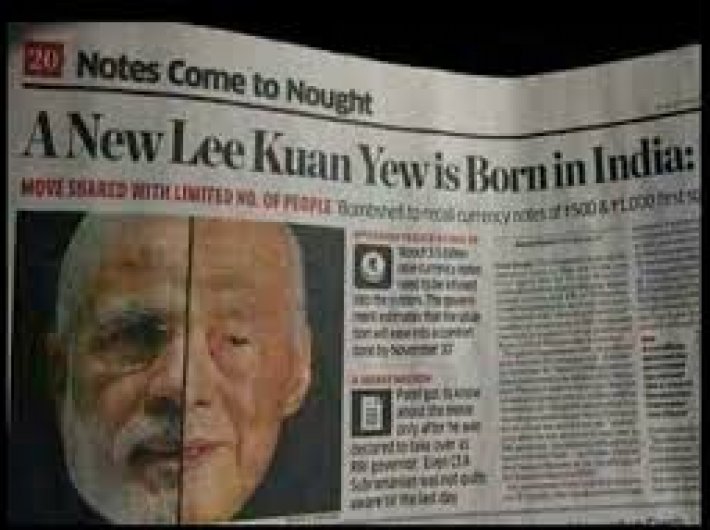It has been a bag of mixed response, with varied opinions, from the foreign media
While the nation struggles to adapt to changes since demonetisation, foreign media has been widely covering the Narendra Modi government’s move and the public’s response.
Writing on the direct impact of the announcement on general public, a report by The New York Times, published on November 8, said that “ATMs around the country were overrun Tuesday night with people confused about the plan and trying to complete financial transactions before the machines closed the following day”. In some places, hundreds stood in line in front of a single ATM, it added.
The report quoted HDFC chairman Deepak Parekh calling the step as “Modi’s transformational reform,” adding that “it will be disruptive, it will be inconvenient, but in the medium term, it will be very good.”
Some experts like Pradip Shah, founder and former managing director of Credit Rating Information Services of India Limited, were quoted not being too optimistic about the move. “It is regrettable this will inconvenience” 1.29 billion people without stopping “the flow of black money”, Shah told NYT.
The Economist called the step as dramatic. Describing it further, an article said, “The hastily discontinued tender represents 86% of all the currency in circulation (equivalent to 11% of GDP) in a country where cash remains king. Many Indian residents found themselves with little still-legal cash on hand ahead of a forcibly imposed bank holiday and a two-day shutdown of ATMs. A senior bank executive in Mumbai admitted to raiding his daughter’s piggy bank to pay for tolls on his way to work.”
It added that there were some aspects of the plan which were difficult to fathom. “Prominent economists, such as Kenneth Rogoff of Harvard University, are keen to scrap big-denomination notes altogether. But India will merely replace them. Worse, it will add a 2,000-rupee series—introducing a note that will have few conceivable uses other than mattress-stuffing, smuggling or gambling (getting change for even a 500-rupee note is already close to impossible).”
The article also pointed out the timing (of the announcement) to be odd. It said, “India has recently introduced a system that makes it easy for anybody to make or receive payments from their mobile phone, whether they be businesses or individuals. But the Unified Payments Interface, as it is known, is still in the early stages of implementation, so cannot really help overcome the current cash-crunch. Mr Modi also took the cash out of circulation just as polls opened in America, eventually roiling markets.”
According to a Washington Post report, not all in the public were amused with Modi’s decision. It said, “Panicked customers lined up at banks — sometimes for hours — to exchange and deposit old notes. Fistfights broke out at gas stations when clerks ran out of change; at toll booths, operators simply let cars stream through.”
It, however, added, “Indeed, some of those lined up at banks praised the government’s move, exhibiting the same populist, anti-elite fervour that drove U.S. voters to Donald Trump and U.K. voters to Brexit.”
Meanwhile, Singapore-based The Independent reported how Indian government officials were all in awe of Modi’s move. It quoted a senior government official who equated Modi to Lee Kuan Yew, Singapore’s first prime minister. “From making up his mind to rolling it out yesterday (8 Nov), a new Lee Kuan Yew is born in India. It will be reflected in the legacy of this Prime Minister,” the official said.
An opinion piece in Forbes called the move as well done. It said, “… obviously, there are long lines and no little disruption. Yet small amounts of cash, the sort that might be lying around in a wallet or as an emergency stock, can be changed at the banks into still useful notes. It’s going to be a little more time before the ATM machines are all altered to be able to deal with the new denominations but not that long in a country so large. And larger sums can still be deposited into bank accounts.”
It added that the move was an insistence that the cash must enter the banking, and thus the tax, system. “Cash that can be shown to have been legitimately earned and taxed enters the bank system at no further cost in penalty or tax. Cash that has been untaxed must enter said banking system or become worthless–and once recorded in the system the mills of justice will be able to grind slow and small to ensure that it is taxed.”
Meanwhile the Chinese daily, Global Times, sounded skeptical. An article said, “Modi means well and his decision was made based on the
reality in India, since most illegal business in the underground economy is cash-only, and 500 and 1,000 rupee notes constitute over 80 percent of all cash circulation in India. Nevertheless, we can hardly count on the new rule to fully root out corruption.”
It said that though demonetisation was a bold and decisive step, yet more was required than banning currency notes. “The key should be reforming systems. In this regard, New Delhi might need to look for ideas from Beijing.”
Here is how, according to the article, Modi can learn a few lessons from China: “Since the 18th National Congress of the Communist Party of China, Beijing's anti-corruption campaigns have focused on investigation and the establishment of a legal system against corruption. Over the years, China promoted anti-corruption laws, improved the supervision system, deepened judicial system reforms and adopted measures to make sure the system is transparent. For instance, China's foreign ministry has lately published information about the families of 12 senior officials on its website in an effort to fight against corruption through familial networks by improving transparency. These steps are taken to ensure that achievements made in the struggle against corruption can be consolidated by laws and systems.”
